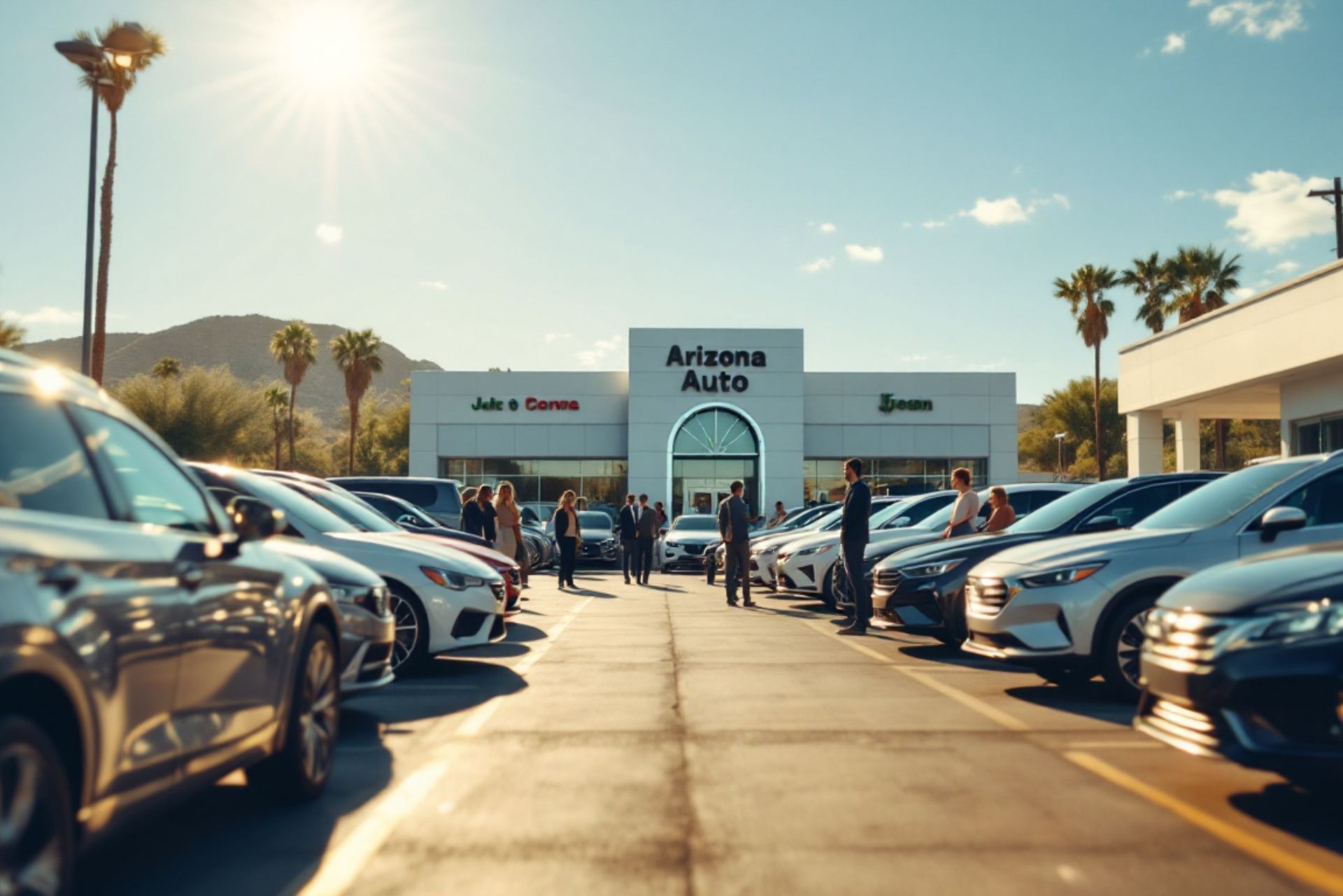Arizona Auto Dealerships Insurance
See How We're Different:
or Call Us:(480) 526-3222

Most Common Business Policies
Index
Contact Us
In the dynamic world of auto dealerships, understanding the intricacies of insurance is crucial for success. Arizona auto dealerships face unique challenges and opportunities, and having the right insurance coverage can make all the difference. This comprehensive guide delves into the various aspects of auto dealership insurance in Arizona, providing insights into coverage options, legal requirements, and tips for choosing the best policy.
Understanding Auto Dealership Insurance
Auto dealership insurance is a specialized type of coverage designed to protect dealerships from various risks associated with their operations. This includes everything from physical damage to vehicles on the lot to liability claims arising from customer interactions. In Arizona, where the automotive market is robust, understanding the nuances of this insurance is essential for dealership owners. The unique landscape of the automotive industry in Arizona, with its diverse demographics and fluctuating economic conditions, necessitates a comprehensive approach to risk management. Dealerships must not only safeguard their assets but also ensure they are compliant with state regulations and prepared for unforeseen circumstances.
Types of Coverage
There are several types of insurance coverage that auto dealerships should consider. Each type serves a specific purpose and can provide critical protection against potential financial losses. Understanding these options can help dealership owners tailor their insurance policies to fit their specific needs and operational risks.
- General Liability Insurance: This coverage protects against claims of bodily injury or property damage that occur on the dealership premises. It is essential for safeguarding against lawsuits and claims from customers or visitors. For instance, if a customer slips and falls while browsing vehicles, this insurance can cover legal fees and medical costs, which can otherwise be financially devastating.
- Property Insurance: This policy covers damage to the dealership's physical property, including buildings, inventory, and equipment. It typically includes protection against risks such as fire, theft, and vandalism. In areas prone to natural disasters, like monsoons in Arizona, having robust property insurance can be a lifesaver, ensuring that the dealership can recover quickly from significant losses.
- Dealer's Open Lot Insurance: This specialized coverage protects vehicles on the dealership lot. It covers physical damage to cars, trucks, and motorcycles, whether they are owned by the dealership or held for sale. This is particularly vital in high-traffic areas where the risk of accidents or damage is elevated.
Additional Coverage Options
In addition to the primary types of coverage, dealerships may want to consider additional policies that can enhance their protection. These additional coverages can provide peace of mind and further safeguard the dealership's financial health against a variety of risks.
- Workers' Compensation Insurance: Required by law in Arizona, this insurance covers medical expenses and lost wages for employees who are injured on the job. Given the physical nature of many dealership roles, from mechanics to sales staff, having this coverage is crucial for protecting both employees and the dealership from potential lawsuits.
- Errors and Omissions Insurance: This coverage protects dealerships against claims of negligence or inadequate work. It is particularly relevant for dealerships that offer financing or warranty services. In a competitive market, maintaining customer trust is paramount, and this insurance can help mitigate the financial impact of mistakes that might otherwise damage a dealership's reputation.
- Cyber Liability Insurance: As dealerships increasingly rely on technology for operations, this
insurance protects against data breaches and cyber attacks that could compromise customer information. With the rise of online sales and digital transactions, having robust cyber liability coverage is becoming more critical, as dealerships are prime targets for cybercriminals seeking sensitive customer data.

Legal Requirements for Arizona Auto Dealerships
Operating an auto dealership in Arizona comes with specific legal obligations, including insurance requirements. Understanding these regulations is vital for compliance and to avoid potential penalties.
Mandatory Insurance Policies
Arizona law mandates certain types of insurance for auto dealerships. These include:
- Workers' Compensation: As mentioned earlier, this is a legal requirement for all businesses with employees in Arizona. It provides coverage for work-related injuries and illnesses.
- Liability Insurance: While not legally required, having general liability insurance is highly recommended to protect against potential lawsuits and claims.
Licensing and Bonding Requirements
In addition to insurance, Arizona auto dealerships must adhere to licensing and bonding requirements. The Arizona Department of Transportation (ADOT) oversees the licensing process, ensuring that dealerships meet specific standards.
Dealerships are required to obtain a dealer license, which involves submitting an application, paying fees, and providing proof of insurance. Additionally, many dealerships must post a surety bond, which acts as a financial guarantee that the dealership will comply with state laws and regulations. This bond typically ranges from $25,000 to $100,000, depending on the dealership's size and the number of vehicles sold. This requirement not only protects consumers but also ensures that dealerships operate with integrity and accountability.
Furthermore, dealerships must also comply with zoning regulations, which dictate where a dealership can be located. These regulations are crucial for maintaining the character of neighborhoods and ensuring that commercial activities do not disrupt residential areas. Dealerships may need to seek special permits if they wish to operate in certain zones, adding another layer of complexity to the establishment of a new business. Understanding these zoning laws can be essential for avoiding costly fines and ensuring a smooth operation from the outset.
Choosing the Right Insurance Provider
Selecting the right insurance provider is a critical step for any auto dealership. The right partner can offer tailored coverage options and exceptional customer service, ensuring peace of mind for dealership owners.
Factors to Consider
When evaluating potential insurance providers, consider the following factors:
- Experience and Expertise: Look for insurers with experience in the auto dealership industry. They will have a better understanding of the unique risks and coverage needs.
- Customer Reviews: Research customer reviews and testimonials to gauge the insurer's reputation and reliability. Positive feedback can indicate a trustworthy provider.
- Coverage Options: Ensure that the insurer offers a range of coverage options that can be customized to fit the specific needs of the dealership.
Getting Quotes and Comparing Policies
Once potential providers have been identified, obtaining quotes is the next step. It’s advisable to request quotes from multiple insurers to compare coverage options and pricing.
When comparing policies, pay close attention to the details, including coverage limits, deductibles, and exclusions. A lower premium may not always equate to better coverage, so thorough evaluation is essential.
Additionally, consider the claims process and how responsive the insurer is when handling claims. A provider that is known for its swift and fair claims handling can make a significant difference in times of need. Look for insurers that offer 24/7 claims support, as this can provide reassurance that assistance is available whenever it’s needed. Furthermore, inquire about any additional services they offer, such as risk management resources or training programs that can help mitigate potential losses.
It’s also beneficial to assess the financial stability of the insurance provider. Check their ratings from independent agencies, as this can provide insight into their ability to pay claims in the future. A financially secure insurer is more likely to be around when you need them most, making this an important factor in your decision-making process. Understanding the insurer's approach to underwriting and their willingness to work with your dealership's unique circumstances can also enhance the partnership, ensuring that you receive the most appropriate coverage for your business needs.
Cost of Insurance for Arizona Auto Dealerships
The cost of insurance for auto dealerships in Arizona can vary significantly based on several factors. Understanding these factors can help dealership owners budget effectively and find the best coverage at a reasonable price.
Factors Influencing Insurance Costs
Several key factors influence the cost of auto dealership insurance:
- Location: The geographical location of the dealership can impact insurance rates. Areas with higher crime rates or higher incidences of accidents may result in higher premiums.
- Size of the Dealership: Larger dealerships with more inventory and employees typically face higher insurance costs due to increased risk exposure.
- Type of Vehicles Sold: The type of vehicles sold can also affect premiums. Luxury or high-performance vehicles may result in higher coverage costs due to their value.
Average Insurance Costs
While specific costs can vary widely, it’s helpful to have a general idea of what to expect. On average, Arizona auto dealerships can expect to pay anywhere from $3,000 to $10,000 annually for comprehensive insurance coverage.
Dealerships should also factor in additional costs for optional coverages, such as cyber liability or errors and omissions insurance, which can further increase overall expenses.
In addition to these basic coverages, dealerships may also want to consider the potential benefits of specialized insurance products. For instance, floor plan insurance is designed specifically for auto dealerships, covering the inventory of vehicles that are financed through a lender. This type of policy can be crucial for maintaining financial stability, especially in times of economic uncertainty. Furthermore, dealerships that offer financing options to customers may need to invest in additional liability coverage to protect against potential claims related to financing disputes or defaults.
Moreover, the evolving landscape of technology in the automotive industry has introduced new risks that dealerships must be aware of. With the increasing reliance on digital platforms for sales and customer interactions, the threat of cyberattacks has grown significantly. This makes cyber liability insurance not just an optional add-on, but a necessary component of a comprehensive risk management strategy. Dealerships should assess their digital security measures and consider policies that cover data breaches, identity theft, and other cyber-related incidents to safeguard their operations and customer information.

Risk Management Strategies for Auto Dealerships
Implementing effective risk management strategies can help auto dealerships minimize potential losses and reduce insurance costs. Proactive measures not only protect the business but can also lead to lower premiums. By understanding and addressing the various risks that can impact their operations, dealerships can create a more resilient business model that thrives even in challenging environments.
Safety Protocols and Employee Training
Establishing safety protocols and providing regular employee training can significantly reduce the likelihood of accidents and injuries. This includes:
- Conducting regular safety audits of the dealership premises.
- Offering training sessions on safe vehicle handling and customer interactions.
- Implementing emergency response plans for various scenarios, including natural disasters or accidents.
In addition to these measures, dealerships can benefit from fostering a culture of safety among employees. Encouraging staff to report potential hazards and participate in safety committees can lead to a more proactive approach to risk management. Furthermore, providing incentives for employees who consistently adhere to safety protocols can motivate them to prioritize safety in their daily tasks, ultimately creating a safer environment for both staff and customers.
Regular Maintenance and Security Measures
Maintaining the dealership's physical property and implementing security measures can help prevent losses. This includes:
- Regular maintenance of vehicles and equipment to ensure they are in good working order.
- Installing security cameras and alarm systems to deter theft and vandalism.
- Implementing access control measures to restrict entry to authorized personnel only.
Moreover, dealerships should consider investing in advanced technology solutions, such as remote monitoring systems that provide real-time alerts for any suspicious activity. This not only enhances security but also allows for quicker responses to potential threats. Additionally, building strong relationships with local law enforcement and community organizations can lead to collaborative efforts that further enhance the safety and security of the dealership, creating a supportive network that benefits everyone involved.
Common Claims in Auto Dealership Insurance
Understanding the types of claims that commonly arise in the auto dealership industry can help owners prepare and mitigate risks. Being aware of these claims can also guide insurance coverage decisions.
Property Damage Claims
Property damage claims are among the most common in the auto dealership sector. This can include damage to vehicles on the lot due to natural disasters, accidents, or vandalism. Dealerships should ensure their property insurance adequately covers these risks. Additionally, dealerships often have extensive inventories that may include high-value vehicles, parts, and equipment. Therefore, it is crucial to conduct regular assessments of the property and inventory to identify vulnerabilities. Investing in security measures such as surveillance cameras and alarm systems can significantly reduce the risk of theft and vandalism, further safeguarding the dealership's assets.
Liability Claims
Liability claims can arise from various situations, including slip-and-fall accidents on dealership premises or disputes over vehicle sales. Having robust general liability insurance is essential to protect against these claims. Furthermore, dealerships should consider implementing safety protocols and staff training to minimize the likelihood of accidents. For instance, ensuring that walkways are clear of obstacles and properly maintained can help prevent slips and falls. Additionally, clear communication and documentation during the sales process can mitigate disputes, as misunderstandings can lead to costly legal battles. By fostering a culture of safety and transparency, dealerships can not only reduce their liability exposure but also enhance customer trust and satisfaction.
Conclusion
In the competitive landscape of Arizona auto dealerships, understanding insurance is not just a necessity; it is a vital component of business strategy. By comprehensively assessing coverage options, complying with legal requirements, and implementing effective risk management strategies, dealership owners can protect their investments and ensure long-term success.
As the automotive industry continues to evolve, staying informed about insurance trends and changes in regulations will be crucial. With the right knowledge and resources, Arizona auto dealerships can navigate the complexities of insurance with confidence and security.
